英国教育体系英文版介绍短文
英国教育体系英语作文120字
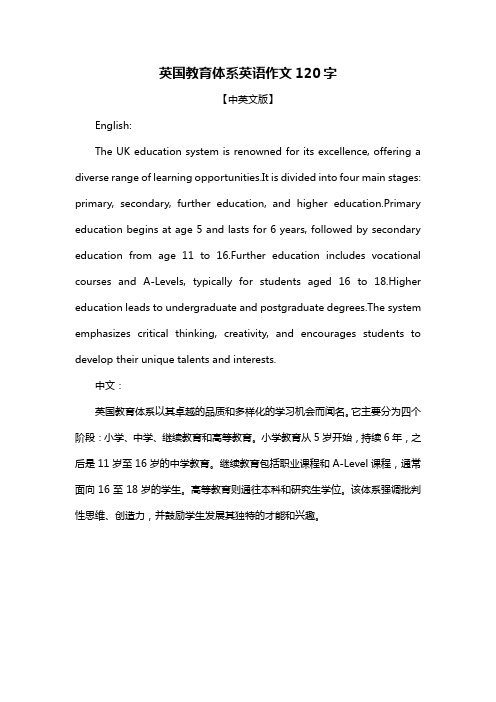
英国教育体系英语作文120字【中英文版】English:The UK education system is renowned for its excellence, offering a diverse range of learning opportunities.It is divided into four main stages: primary, secondary, further education, and higher education.Primary education begins at age 5 and lasts for 6 years, followed by secondary education from age 11 to 16.Further education includes vocational courses and A-Levels, typically for students aged 16 to 18.Higher education leads to undergraduate and postgraduate degrees.The system emphasizes critical thinking, creativity, and encourages students to develop their unique talents and interests.中文:英国教育体系以其卓越的品质和多样化的学习机会而闻名。
它主要分为四个阶段:小学、中学、继续教育和高等教育。
小学教育从5岁开始,持续6年,之后是11岁至16岁的中学教育。
继续教育包括职业课程和A-Level课程,通常面向16至18岁的学生。
高等教育则通往本科和研究生学位。
该体系强调批判性思维、创造力,并鼓励学生发展其独特的才能和兴趣。
英国教育体系英文版

School Tie is Mark of Social Class
Men wear school ties as belts – proudly displaying attendance at certain school Attendance at certain school (like Oxford or Cambridge) is single best way to guarantee successful career Where educated is very important for your future
HIGHER EDUCATION
Most Univ. public paid by gov. Univ. of Buckingham exception (priv) Long history back to 12 and 13th cent Scottish univ. St. Andrews, Glasgow, Edinburgh and Aberdeen 14 & 15th c. Other univ. 19th and 20th centuries Large growth in 1960’s 1992 polytechs and others-univ.
BRITISH EDUCATION SYSTEM
Chapter 9
Purpose
Teach basics – reading, writing, arithmetic Socialize the children-taught rules and values needed to become good citizens State heavily involved –when, where, how and what children taught
英国教育英语作文

英国教育英语作文British Education System。
The British education system is highly regarded around the world for its quality and excellence. It is a comprehensive system that caters to the needs of students of all ages and abilities, from primary school to university.Primary Education。
Primary education in the UK is compulsory for all children aged between 5 and 11. The curriculum is divided into two stages: Key Stage 1 (ages 5-7) and Key Stage 2 (ages 7-11). The focus is on developing basic literacy and numeracy skills, as well as introducing a range of subjects such as science, history, geography, art, and music.Secondary Education。
Secondary education in the UK is divided into two stages: Key Stage 3 (ages 11-14) and Key Stage 4 (ages 14-16). During these years, students study a range of subjects including English, maths, science, history, geography, modern foreign languages, and technology. They also havethe option to choose additional subjects, such as art, music, drama, and physical education.At the end of Key Stage 4, students take their GCSE exams, which are the equivalent of high school diplomas in other countries. These exams are used to determine whether students are eligible to continue their education at A-level, vocational, or apprenticeship programs.Post-16 Education。
演示文稿英国教育体系英文

Case Study
❖ Compared with that in Chinese counterparts, the curriculum in the UK primary or secondary schools is much simpler. (esp. mathematics & reading) WHY? Is their Intelligence Quotient low?
to learn A-level classes for 2 years.
❖ At 18, they take GCE A-level examinations
(Advanced General Certificate of Education 高级水平普
通教育证书=大学入学考试), usually in not more than 3 subjects. It’s necessary to have A-levels
Infants Schools = First Schools (for 2 years from 5)
Junior Schools (for 4 years to 11) ❖ There’s little or no specialist subject teaching and
great emphasis is on literacy and numeracy in early years. ❖ Prep Schools (预备学校) (from 7/8 to 13) (separate; fees; entrance exam )
School Funding
State schools
Public schools
介绍英国的高中英文作文
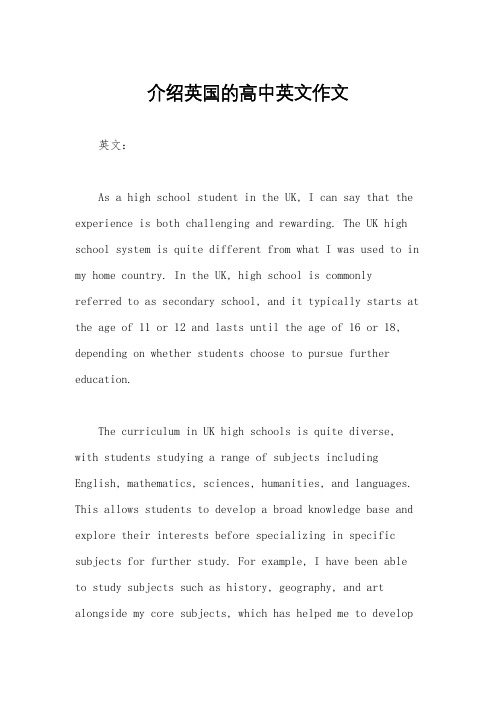
介绍英国的高中英文作文英文:As a high school student in the UK, I can say that the experience is both challenging and rewarding. The UK high school system is quite different from what I was used to in my home country. In the UK, high school is commonlyreferred to as secondary school, and it typically starts at the age of 11 or 12 and lasts until the age of 16 or 18, depending on whether students choose to pursue further education.The curriculum in UK high schools is quite diverse, with students studying a range of subjects including English, mathematics, sciences, humanities, and languages. This allows students to develop a broad knowledge base and explore their interests before specializing in specific subjects for further study. For example, I have been able to study subjects such as history, geography, and art alongside my core subjects, which has helped me to developa well-rounded education.In addition to academic subjects, UK high schools also place a strong emphasis on extracurricular activities and personal development. For example, my school offers a wide range of sports, clubs, and societies that allow studentsto pursue their interests and develop important skills such as teamwork, leadership, and communication. I havepersonally been involved in the school's drama club, which has allowed me to improve my public speaking and confidence.Furthermore, UK high schools also provide ample support for students in terms of career guidance and university preparation. Teachers and counselors are always availableto provide advice and assistance with university applications, career choices, and personal development.This has been particularly helpful for me as I navigate the process of applying to universities and considering myfuture career options.Overall, my experience in a UK high school has been incredibly enriching. I have been able to developacademically, personally, and socially, and I feel well-prepared for the next stage of my education and career.中文:作为一名在英国读高中的学生,我可以说这段经历既具有挑战性,又非常有收获。
英语国家概况英国的教育体制
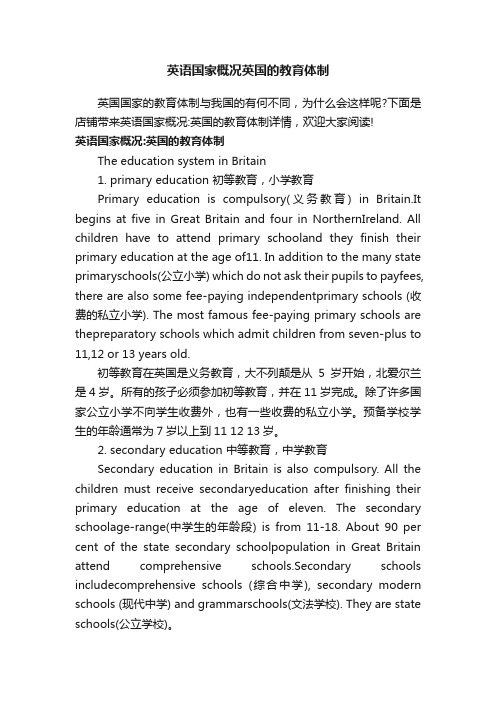
英语国家概况英国的教育体制英国国家的教育体制与我国的有何不同,为什么会这样呢?下面是店铺带来英语国家概况:英国的教育体制详情,欢迎大家阅读!英语国家概况:英国的教育体制The education system in Britain1. primary education 初等教育,小学教育Primary education is compulsory(义务教育) in Britain.It begins at five in Great Britain and four in NorthernIreland. All children have to attend primary schooland they finish their primary education at the age of11. In addition to the many state primaryschools(公立小学) which do not ask their pupils to payfees, there are also some fee-paying independentprimary schools (收费的私立小学). The most famous fee-paying primary schools are thepreparatory schools which admit children from seven-plus to 11,12 or 13 years old.初等教育在英国是义务教育,大不列颠是从5岁开始,北爱尔兰是4岁。
所有的孩子必须参加初等教育,并在11岁完成。
除了许多国家公立小学不向学生收费外,也有一些收费的私立小学。
预备学校学生的年龄通常为7岁以上到11 12 13岁。
2. secondary education 中等教育,中学教育Secondary education in Britain is also compulsory. All the children must receive secondaryeducation after finishing their primary education at the age of eleven. The secondary schoolage-range(中学生的年龄段) is from 11-18. About 90 per cent of the state secondary schoolpopulation in Great Britain attend comprehensive schools.Secondary schools includecomprehensive schools (综合中学), secondary modern schools (现代中学) and grammarschools(文法学校). They are state schools(公立学校)。
英语国家概况期末考试英国教育体制作文
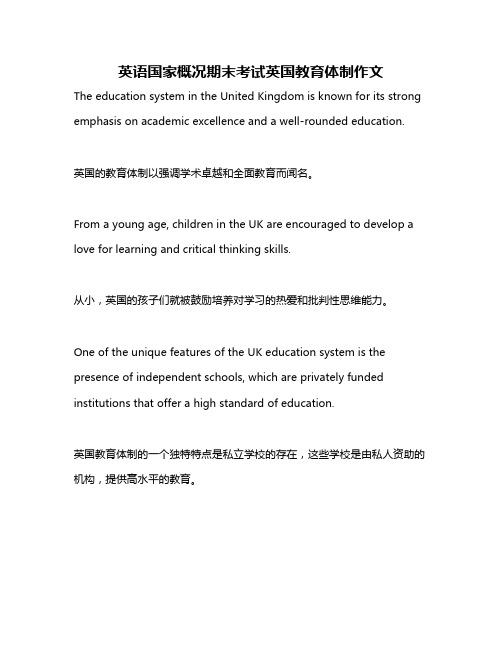
英语国家概况期末考试英国教育体制作文The education system in the United Kingdom is known for its strong emphasis on academic excellence and a well-rounded education.英国的教育体制以强调学术卓越和全面教育而闻名。
From a young age, children in the UK are encouraged to develop a love for learning and critical thinking skills.从小,英国的孩子们就被鼓励培养对学习的热爱和批判性思维能力。
One of the unique features of the UK education system is the presence of independent schools, which are privately funded institutions that offer a high standard of education.英国教育体制的一个独特特点是私立学校的存在,这些学校是由私人资助的机构,提供高水平的教育。
These schools often have smaller class sizes, more resources, and a wider range of extracurricular activities compared to state-funded schools.与公立学校相比,这些学校通常拥有较小的班级规模、更多的资源和更广泛的课外活动。
However, access to independent schools is often limited to those who can afford the high tuition fees, leading to criticisms of elitism and inequality within the education system.然而,私立学校的学费通常较高,只有富有的家庭才能负担得起,这导致对教育体制内精英主义和不平等的批评。
英国教育英语作文
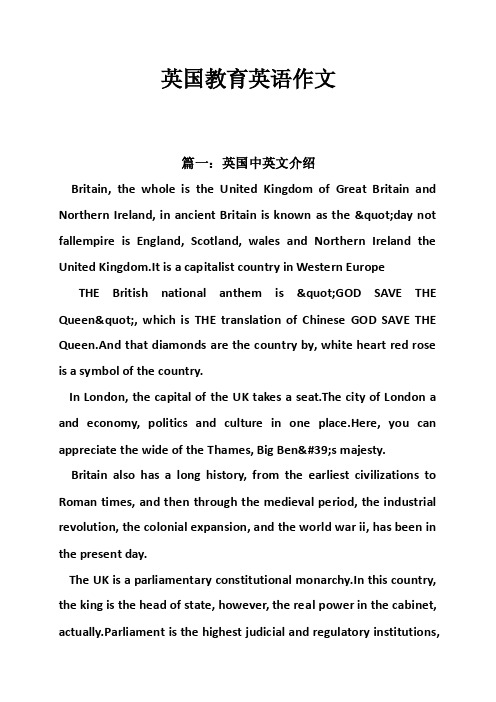
英国教育英语作文篇一:英国中英文介绍Britain, the whole is the United Kingdom of Great Britain and Northern Ireland, in ancient Britain is known as the "day not fallempire is England, Scotland, wales and Northern Ireland the United Kingdom.It is a capitalist country in Western Europe THE British national anthem is "GOD SAVE THE Queen", which is THE translation of Chinese GOD SAVE THE Queen.And that diamonds are the country by, white heart red rose is a symbol of the country.In London, the capital of the UK takes a seat.The city of London a and economy, politics and culture in one place.Here, you can appreciate the wide of the Thames, Big Ben's majesty.Britain also has a long history, from the earliest civilizations to Roman times, and then through the medieval period, the industrial revolution, the colonial expansion, and the world war ii, has been in the present day.The UK is a parliamentary constitutional monarchy.In this country, the king is the head of state, however, the real power in the cabinet, actually.Parliament is the highest judicial and regulatory institutions,by the king, under the house of lords and the house of Commons On the economic front, the UK is the world's one of the important economic and trade and the global financial center.He is still the world's sixth-largest economy system, is the world fastest growing economy and one of the highest living standards.Among them, the household is its export of Rolls-Royce British culture is also very rich.First,the education popularity is very high, it also promoted the development of the British education.Britain's education and academic research level is currently in the world's leading position.The world-famous education have a holy land at the university of Cambridge and Oxford University.Except, of course, education, the British sports is also very rich.One of the most famous ball sport is football, rugby and cricket.Among them, the cricket is also known as "the movement of a gentleman, it is by 11 people alternating attacks by both teams and Fielding a team sport. And, the British are sports stars, David Beckham is the most typical representativeIn Britain, there are a variety of delicious.If you are in the UK, you can enjoy a hearty breakfast.The British for breakfast is very exquisite!Restaurant supply in Britain there are many different kinds of food, fruit juice, fruit, eggs,meat, wheat rice porridge, bread, jam and coffee, etc.In the popular afternoon TEA (HIGH TEA) was given from the UK, its a famous Victoria typeMore is also very suitable for living, Britain's climate is temperate maritime climate throughout the year.In Britain, is humid warm all yearround.Especially suitable for living.All in all, Britain is a European country full of cultural atmosphere. If you want to learn native English and European culture, English is definitely a good choice英国英国,全程是大不列颠及北爱尔兰联合王国,在古代英国又被叫做“日不落”帝国是有英格兰苏格兰、威尔士和北爱尔兰所组成的联合王国。
- 1、下载文档前请自行甄别文档内容的完整性,平台不提供额外的编辑、内容补充、找答案等附加服务。
- 2、"仅部分预览"的文档,不可在线预览部分如存在完整性等问题,可反馈申请退款(可完整预览的文档不适用该条件!)。
- 3、如文档侵犯您的权益,请联系客服反馈,我们会尽快为您处理(人工客服工作时间:9:00-18:30)。
英国教育体系英文版介绍短文英国的教育体系经过几百年的沿革,相当的完善和复杂,这里就有它的英文版介绍。
下面为大家带来英国教育体系英文简介,希望对你有所帮助!The events that lead directly to the birth of the modern system of education in England are to be sought mainly in the second half of the 19th-century.There were certain individuals at the beginning of the 19th century who were in favour of widespread education,however,for a number of reasons,they did not have the backing either of the government or of the ter on in the century leaders of the Chartist Movement and the Radicals were in favour of some sort of national system of education.However,it is safe to say that there was no widespread desire for the education of the population as a whole.In the social legislation of this period education did not become a real priority until the year of the first Education Act,1870.Obstacles in way of a national system of free compulsory educationThe establishment of a national system of education came late in England mainly because of the social,economic and religious climate of the century.1.The higher classes of society had no interest in advocating the cultural development of the working classes.On the contrary,the effects of the revolutionary spirit in Europe reinforced conservative attitudes that were certainly not conducive to advocating the development of the critical faculties of the people as a whole.2.Neither did the vast majority of the working class have any real interest in education.Child labour was common practice in this period and working-class families were very reluctant to give up the earnings of their children for the benefit of education.The employment of children continued to increase even after 1850.3.Also the effect of Protestantism,with its emphasis on individualism,personal salvation,the private reading and interpretation of Scripture,ran contrary to any sort of collectivist thought.4.Religious conflict also delayed the establishment of a national system of education.One example of this can be seen in the reaction to the clauses regarding education in the 1843Factory Bill.There was violent opposition on the part of nonconformists and Catholics alike because,according to the Bill,headmasters had to be of the Church of England.Furthermore,the children were to be taught the catechism and be present at liturgical celebrations as well as service on Sundays.The Bill failed.5.The idea of secular education had never been popular during the cation had almost exclusively been under the control of the established church.Furthermore,we should not forget the conflict between secular and religious thought that characterised the century,especially the latter half.Given the cultural and religious climate of the century it became obvious that any nondenominational system of education would be well nigh impossible.It was only in the 20th century,with the rise of indifference towards religious teaching,that general nondenominational schooling became possible.Denominational education was further reinforced by the increase in the Catholic population due to the wave of Irish immigrants during and following the Great Famine in Ireland (1845-50).6.It was also thought that the voluntary school system was quite successful and that it was better not to encouragegovernment intervention.Furthermore,the dominant laissez-faire theory of the time meant that,as in most areas,any direct intervention on the part of the state in the field of education was to be discouraged.The state was only too happy to leave education to the private sector,voluntary or cation could not constitute an exception to the tenaciously upheld doctrine of laissez-faire.However,these voluntary institutions did not have the influence or power to construct a nationwide system.Economic development and the increase of wealth were seen to be priority issues.The question of education only attracted very limited attention.Tendencies and events favouring national educationNot everything was negative; there were quite distinct undercurrents of thought beginning to emerge that eventually led to the 1870 Education Act.During the century,and particularly during the second half,we have the beginnings of a national system of education that owes its birth to many factors.1.From the first decade of the 19th-century there emerged indications of new thinking in the field of education.Of particular interest is the Bill introduced into theHouse of commons by Samuel Whitbread in 1807.2.In 1807 Samuel Whitbread proposed to deal with the whole of the Poor Law with the introduction of a Bill in the House of Commons.Of particular interest is the first part of the Bill,which dealt specifically with education.Whitbread advocated making the parish responsible for education and proposed that each child should have two years of education between the ages of 7 and 14.He thought this would reduce crime and pauperism.3.It was considered too expensive to implement and it was also thought that the introduction of such a scheme would take the people away from manual work and make them dissatisfied with their social situation.Although unsuccessful the thought of generalised education for the masses was even then being expressed and was later to be reiterated constantly throughout the century eventually leading up to the 1870 Education Act.4.The idea of widespread education was also helped by the gradual increase in collectivist thought especially after 1865.This is quite evident in the works of Carlyle and Ruskin.It was only after this date that any idea of widespread state intervention in the field of education could find fertile ground.5.The various Factory Acts of 1833,1844,and 1867 were another contributory factor towards the general tendency towards national education.These acts focused not only on the condition of workers but they also had the effect of imposing certain restrictions on child labour,which in turn favoured the opportunity of an alternative:education for the child.6.In the second half of the 19th-century crime and pauperism increased,so did riots strikes and social unrest.The commercial and manufacturing supremacy of Britain was in decline and this was seen to be mostly due to the fact that other European countries had a more developed technical education system.Political stability and economic prosperity now seemed to be associated with the education of the cation now seemed financially viable.7.In 1869 two other societies were established:the Education League,which turned secular and the National Education Union,which was conservative and Anglican.It was mainly due to these two societies that the Education Act of 1870 was passed.The Education Act of 1870It was with the Education Act of 1870,also known as the "Forster Act",that we have the real birth of themodern system of education in England.This not only gave rise to a national system of state education but also assured the existence of a dual system - voluntary denominational schools and nondenominational state schools.The act required the establishment of elementary schools nationwide.These were not to replace or duplicate what already existed but supplement those already run by the churches,private individuals and guilds.The country was divided into school districts and in those areas where there was inadequate provision school boards were to be elected.These were responsible for raising sufficient funds to maintain the schools.The schools were often called " board schools".These elementary schools had to be non-denominational.The school boards could charge a weekly fee not exceeding 9 pence.For a limited period the school boards could pay the fees if the parents were unable to do so.The Voluntary Schools could also receive such payment of fees from the school boards.They had to guarantee attendance for all children in their respective districts between the ages of 5 and 13.The School Board could appoint officers to enforce attendance.Theseofficers or "Board Men",as they were commonly known,became one of those terribly menacing figures firmly implanted in the minds of young schoolboys.This figure was an effective deterrent in playing truant.All the more menacing because the child could only picture him in his imagination (if he faithfully attended school,that is!).He was also known as the School Attendance Officer.Religious instruction was an integral part of the school curriculum but was not compulsory.This was to be nondenominational.Since 1870 Voluntary Schools declined except Roman Catholic Schools because Boards Schools provided better buildings and higher pay for teachers.Elementary education became effectively free with the passing of the 1891 Education Act.英国教育体系介绍英国教育体系总体来说分为三个阶段:义务教育(Compulsory Education),延续教育(Further Education)和高等教育(Higher Education)。
